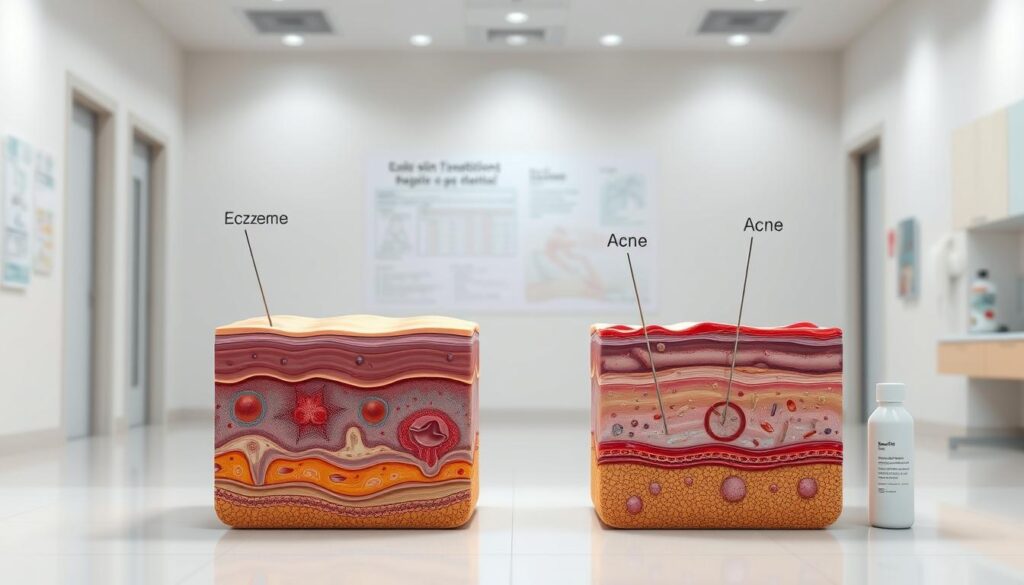Welcome to a key moment in your skin wellness journey. Everyone wants a clear complexion and glowing skin. But, getting and keeping it can seem hard. Don’t worry, expert dermatology tips and skin care advice can make it happen.
If you’re fighting tough skin problems or just want to boost your skin’s shine, we’ve got you covered. We’ll break down skin health in simple terms. You’ll learn how to tackle common skin issues and get tips for better skin care. Start using these tips daily to see big improvements in your skin’s look and health.
Getting to radiant skin needs the right advice. If you need custom skin care tips, visit our contact page. Now, get ready to learn a lot and start your journey to better, happier skin.
Key Takeaways
- Professional guidance is key to overcoming skin challenges.
- A clear complexion and glowing skin are achievable goals.
- Understanding skin conditions is essential for effective management.
- Diet and skincare routines significantly influence skin health.
- Professional dermatology tips can be complemented with at-home solutions.
- Your skin wellness journey is unique, and personalized care can make all the difference.
Understanding Common Skin Problems

Skin health is key for how we look and feel. We’ll look at acne, eczema, psoriasis, and sun damage. Knowing what causes them and how to treat them is important. We’ll talk about how to keep your skin healthy and boost your confidence.
Acne: Causes and Prevention
Acne is common among teens and adults. It can really hurt your self-esteem. To fight acne, first understand what causes it: hormones, too much oil, and dead skin cells clogging pores.
To stop acne, use a skincare routine that fits your skin. Stay away from makeup that can block pores. Also, eat less sugar and dairy.
Eczema and Psoriasis: Managing Chronic Conditions
Living with chronic skin conditions like eczema and psoriasis is tough. But, managing them daily is essential. For eczema relief and psoriasis management, use gentle products and keep your skin moist. Try to reduce stress too.
There are also treatments and natural remedies that can help control outbreaks. They can also help your skin heal better.
Sun Damage: Preventive Measures and Treatments
Too much sun can cause serious skin problems, like aging and cancer. To protect your skin, use sunscreen with broad-spectrum protection. Wear clothes that cover you and stay in the shade when the sun is strongest.
If you already have sun damage, there are treatments. Topical antioxidants and professional treatments can help repair your skin.
The Role of Diet and Nutrition in Skin Health
What we eat greatly affects our skin’s look. Eating right can make a big difference in skin health. Let’s explore skin-enhancing foods and how they help. We’ll also see what foods might harm your skin.
Foods to Love for Vibrant Skin
Adding foods rich in nutrients to your diet is key for healthy skin. These foods are tasty and full of vitamins and antioxidants. Here are some skin-enhancing foods that are good for your skin:
- Avocados: They’re full of healthy fats that keep your skin flexible and moist.
- Walnuts: They have essential fatty acids that your body can’t make itself.
- Sweet Potatoes: They’re packed with beta-carotene, which acts as a natural sunblock.
- Broccoli: It’s rich in vitamins and minerals like zinc, vitamin A, and vitamin C.
- Dark Chocolate: It has antioxidants that can improve skin texture and protect against sun damage.
Avoiding Skin Saboteurs: What to Reduce or Eliminate
Some foods can make skin problems worse. Cutting down or avoiding these foods can help your skin:
- Refined Sugars: Too much can cause inflammation and lead to breakouts.
- Dairy Products: Some people find that dairy can trigger acne.
- Fried and Fast Foods: They often have trans fats that make skin oily and clog pores.
- Alcohol: Drinking too much can dry out your skin and make it hard to keep moisture.
Knowing how diet affects your skin can help you choose better foods. Eating a clear skin diet can make your skin look and feel better.
Daily Skincare Routines for Different Skin Types
Knowing your skin type is key to a good skin care routine. Whether you have oily, dry, combination, or sensitive skin, a personalized skin care plan can greatly improve your skin’s health and look.
Finding out your skin type is the first step in personalized skincare. It helps choose the right products and routines for your skin. Then, you can adjust your daily routine to meet your skin’s specific needs, leading to better results.
Step-by-Step Guide for Each Skin Type
| Skin Type | Essential Products | Daily Routine Tips |
|---|---|---|
| Oily Skin | Gentle cleanser, oil-free moisturizer, mattifying sunscreen SPF 30+ | Focus on cleansing twice daily to manage excess sebum. Avoid heavy cream-based products to prevent clogging pores. |
| Dry Skin | Hydrating cleanser, rich moisturizer, hydrating sunscreen SPF 30+ | Incorporate products that include hydrating ingredients like hyaluronic acid and glycerin, and limit washing your face to avoid stripping natural oils. |
| Combination Skin | Balancing cleanser, lightweight moisturizer, broad-spectrum sunscreen SPF 30+ | Use products that maintain moisture balance, addressing both dry and oily areas appropriately. |
| Sensitive Skin | Soft cleanser, soothing moisturizer, mineral-based sunscreen SPF 30+ | Choose products with minimal and non-irritating ingredients. Perform patch tests before using new products extensively. |
By following these tips, you can create a skin care routine that suits your skin type. But, remember that everyone’s skin reacts differently to products. Getting advice from a dermatologist for personalized skin care is a good idea, even more so for those with ongoing skin problems or when trying new products.
Getting the most out of your skin care routine takes time and sticking to it. Being patient and consistent with your routine is essential for healthy, glowing skin.
Skin Problems
Dealing with skin health can be tough. You have choices like at-home skin care or professional skin treatments. Knowing when to use simple skin care remedies or when to see a doctor is key for healthy skin.
Professional Treatments vs. At-Home Remedies
For small issues like dry skin or breakouts, at-home care works well. It’s cheap and uses natural stuff. But, for serious problems, you need a dermatologist’s help.
When to See a Dermatologist
If your skin problems don’t get better with simple care, see a dermatologist. This is true for bad acne, weird skin spots, or if your skin hurts a lot. A dermatologist can give you the right treatment.
Choosing between home care and doctor visits is important. Here’s what to keep in mind:
| Condition | At-Home Care | Professional Treatment |
|---|---|---|
| Mild Acne | Oils and over-the-counter creams | Prescription medications, laser therapy |
| Chronic Dryness | Intensive moisturizers | Advanced hydration techniques |
| Eczema | Gentle skincare products | Topical steroids, immunomodulators |
Choosing between at-home skin care and professional skin treatments depends on your skin’s problem. For serious issues, always see a specialist for the best care.
Conclusion
As we wrap up, remember that getting clear skin is a journey for you. It needs a plan that fits your skin type and worries. We’ve looked at common skin issues, diet’s role, daily care, and when to see a pro.
Our skin is huge and shows a lot about us. It needs careful care and attention.
In our healthy skin tips summary, we’ve seen the importance of balance, regularity, and being aware. Eating right, protecting your skin from the outside world, and sticking to your skincare routine all help. Remember, patience is key—results take time and effort.
Now, you have the tools to keep working towards clear skin. You know how to handle common skin problems, eat for your skin’s health, and find the right skincare for you. Every step you take is a step towards better skin. Good luck on your journey to healthier, clearer, and happier skin.




